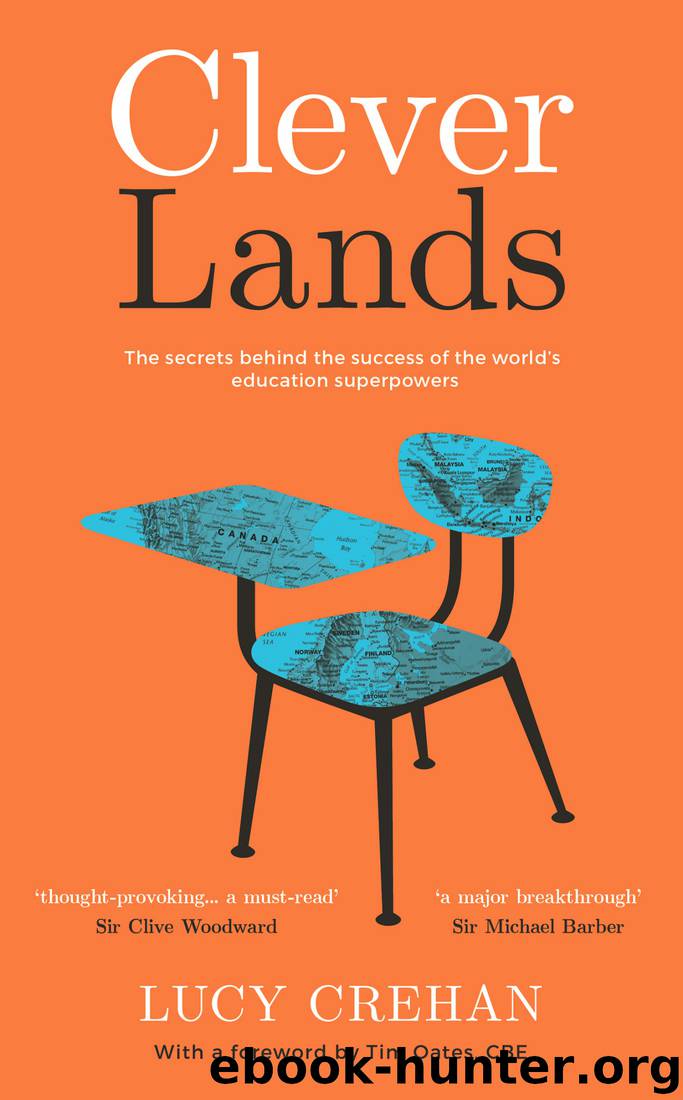Cleverlands by Lucy Crehan

Author:Lucy Crehan [Crehan, Lucy]
Language: eng
Format: epub
ISBN: 9781783522736
Publisher: Random House
Published: 2016-10-14T04:00:00+00:00
It follows that if one isn’t curious about what one is learning, one will lack motivation to learn; that the reason for learning is primarily individual benefit and that whether or not you are good at learning will depend on your individual attributes, which are relatively fixed.
Research on American children and adults’ conceptions of intelligence and ability give support to the existence of the latter idea – and these ideas about ability being fixed become stronger as children grow older.142 However, the same suppositions are not found in East Asian cultures. East Asians are less likely to view people as having innate differences in abilities and more likely to view achievement as a product of effort rather than ability.143 Hess and colleagues found that Chinese mothers were most likely to attribute their children’s failure at school to a lack of effort more than any other factor, whereas this option was selected the least by American mothers when asked the same question.144 Heine and colleagues designed a questionnaire asking Japanese and American students what percentage of intelligence was due to effort, and what was due to talent or innate ability. They found that, on average, European Americans saw effort as accounting for 36 per cent, Asian Americans saw it as accounting for 45 per cent and the Japanese saw it as accounting for 55 per cent.145
You can see then that the Asians do still recognise that there are differences in innate ability between people; they just don’t see it as being as important, because they don’t think it contributes to performance as much as effort does. The title of this section, ‘A clumsy bird that flies first will get to the forest earlier’ is a traditional Chinese proverb, meaning that even someone that is naturally clumsy or stupid can perform better than others, if they try hard enough.
Those who are familiar with the work of psychologist Carol Dweck might recognise the parallels between East Asian educational culture and what Dweck calls ‘growth mindset’. Growth mindset describes the beliefs that people have when they think that intellectual abilities can be cultivated and developed through application and instruction, and it can be contrasted with a fixed mindset, which describes the belief that intellectual abilities are basically fixed – that people have different levels of ability and little can change that. Which mindset children have has huge implications for how they behave when faced with challenge.
Dweck has found that those who believe that intelligence is fixed are therefore motivated to avoid challenging tasks, lest it show that they are not intelligent – something that they don’t believe they can do much about. On the other hand, those with a growth mindset are motivated to seek out challenge, as they believe that their intelligence can grow through taking on challenges and working hard at them.146 Remember the differing responses of the Japanese and Canadian students to ‘success’ and ‘failure’ in Heine’s study? They mirror the behaviours one would expect from those with a growth and a fixed mindset almost exactly.
Download
This site does not store any files on its server. We only index and link to content provided by other sites. Please contact the content providers to delete copyright contents if any and email us, we'll remove relevant links or contents immediately.
| Administration | Assessment |
| Educational Psychology | Experimental Methods |
| History | Language Experience Approach |
| Philosophy & Social Aspects | Reform & Policy |
| Research |
The Art of Coaching Workbook by Elena Aguilar(51199)
Trainspotting by Irvine Welsh(21666)
Twilight of the Idols With the Antichrist and Ecce Homo by Friedrich Nietzsche(18633)
Fangirl by Rainbow Rowell(9251)
Periodization Training for Sports by Tudor Bompa(8273)
Change Your Questions, Change Your Life by Marilee Adams(7783)
This Is How You Lose Her by Junot Diaz(6887)
Asking the Right Questions: A Guide to Critical Thinking by M. Neil Browne & Stuart M. Keeley(5775)
Grit by Angela Duckworth(5615)
Red Sparrow by Jason Matthews(5474)
Paper Towns by Green John(5191)
Room 212 by Kate Stewart(5122)
Ken Follett - World without end by Ken Follett(4732)
Housekeeping by Marilynne Robinson(4447)
The Sports Rules Book by Human Kinetics(4388)
Papillon (English) by Henri Charrière(4274)
Double Down (Diary of a Wimpy Kid Book 11) by Jeff Kinney(4272)
The Motorcycle Diaries by Ernesto Che Guevara(4102)
Exercise Technique Manual for Resistance Training by National Strength & Conditioning Association(4071)
